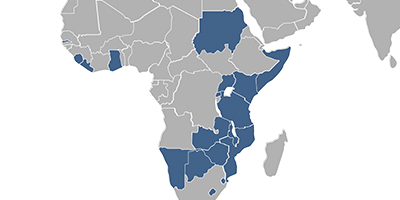ARIPO

See more information about:
International Country Code:
APTime Zone:
UTC/GMT +02:00Currency:
United States dollar ($) (USD)ARIPO PCT regional phase entry
ARIPO PCT regional phase entry
The Harare Protocol on Patents and Industrial Designs has 21 contracting ARIPO states, namely Botswana, Cape Verde, Eswatini, the Gambia, Ghana, Kenya, Lesotho, Liberia, Malawi, Mauritius, Mozambique, Namibia, Rwanda, Sao Tome and Principe, Seychelles, Sierra Leone, Sudan, Tanzania, Uganda, Zambia, and Zimbabwe. All member states of the Harare Protocol, except Eswatini, are also members of the Patent Cooperation Treaty. In Eswatini, only an ARIPO regional patent can be obtained via the PCT route.
- Patent fees
Fees associated with PCT regional phase entry in ARIPO, as well as other patent fees, are available in the fee calculator.
- Deadline for PCT regional phase entry in ARIPO
The time limit for ARIPO regional phase entry is 31 months from the priority date.
- Filing requirements in ARIPO
The official language of the PCT regional phase entry in ARIPO is English. If the application was published in a language other than English, the regional phase application in ARIPO should include the English translation of the description, claims, abstract and any text matter of drawings. The translation should be submitted within 31 months from the priority date.
To obtain the date of filing, a PCT regional phase patent application in ARIPO should contain:
- copy of the International Application;
- description, claims, abstract, any text matter of drawings in English;
- payment of the prescribed fees.
A simply signed Power of Attorney shall be submitted at the time of entry into the regional phase or within 2 months from the date of entry.
If an applicant is not the inventor, a statement explaining the applicant’s right to the invention shall be included into the application.
- Examination of a PCT regional phase patent application in ARIPO
The application is examined as to form and substance alike. The term for requesting substantive examination is 3 years from the international filing date.
- Novelty grace period
The disclosure of an invention at an officially recognized exhibition does not disprove its novelty, if the application is filed within 6 months.
- Grant, validity term and maintenance fees
The official fees for grant and publication should be paid within four months from receipt of the decision to grant a patent. ARIPO patent is valid 20 years from the date of filing in each designated state. Pending applications and granted patents are subject to the payment of annual maintenance fees, starting from the first year. Annual fees must be paid before each anniversary of the international filing date for the following year, at least one month in advance to the ARIPO office. Any annual fee which falls due during the international phase need not be paid until the expiration of the applicable time limit for the entry into the regional phase. The fees are payable in respect of each designated state. Any annual fee which falls due during the international phase need not be paid until the expiration of the applicable time limit for the entry into the regional phase. The fees are payable in respect of each designated state.
- Duration of registration procedure
The average processing time from filing to grant is 2-4 years from the regional phase entry in ARIPO.
- Utility Model
It is possible to obtain utility model protection in ARIPO on the basis of an international application. Utility models must be new and industrially applicable. Applications undergo formal examination only. The validity term is 10 years of the filing date subject to the payment of annual maintenance fees.
- Representation by a patent attorney
For foreign applicants not residing or not having the principle place of business in one of the contracting states, it is necessary to perform PCT regional phase entry in ARIPO through a professional representative (attorney, agent or legal practitioner) authorized before any national office of the Harare protocol countries.
- Note
Online Search Database for ARIPO Patents and Utility Models.
Brief summary is based on the information provided by PalladiumIP Consultants on 21.04.2025
Please contact us if the above information is not in conformity with ARIPO IP Laws